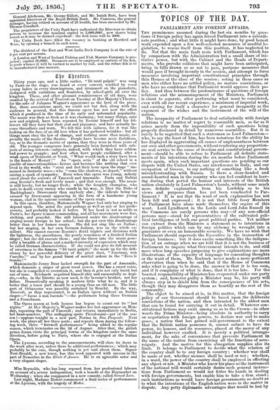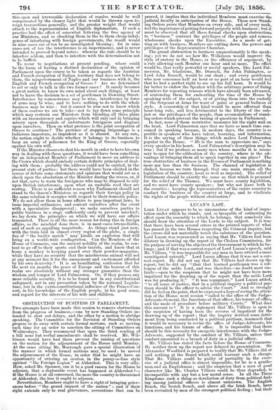TOPICS OF THE DAY.
PARLIAMENT AND FOREIGN AFFAIRS.
THE prominence assumed during the last six months by ques- tions of foreign policy has again forced Parliament into a subordi- nate position ; and what little it might have done, by good honest work expended upon a few well-selected measures. of needful le- gislation, to rescue itself from this position, it has neglected to do. Not that the main fault rests with Parliament, which has by comparison with the Administration but a small share of ini- tiative power, but with the Cabinet and the Heads of Depart- ments, who provoke collisions that might have been anticipated, bring in bills drawn so as not to pass, postpone measures that would pass if brought in early in the session, and attempt to force measures involving important constitutional principles through thin Houses at the close of the session ; acting in these cases as men who either have no settled policy, no mature convictions, or who have no confidence that Parliament would approve their po- licy. And thus between the predominance of questions of foreign relations and the mismanagement of the Ministers, Parliament is about to separate, after performing what must be considered, even with all our recent experience, a minimum of imperial work, and earning for itself a character for general incapacity as the exponent of the wishes and the instrument of the will of the nation.
The incapacity of Parliament to deal satisfactorily with foreign relations is no matter of regret to reasonable men, so far as it arises merely from the impossibility of such questions being properly discussed in detail by numerous assemblies. But it is surely to be regretted that such a statesman as Lord Palmerston— who, to say the least of him, has been notorious for the ability he has displayed in aggravating all causes of unpleasantness between our own and other governments, without rendering any proportion- ate real service to the cause of freedom and constitutional govern- ment—should be able to refuse to Parliament all definite state- ments of his intentions during the six months before Parliament meets again, when such important questions are pending as our dispute with the 'United States, our interference in Italy, and our occupation of Greece, to say nothing of something like a fresh misunderstanding with Russia. Is there a clear-headed and sound-hearted man in the country who can feel confident in leav- ing during that .period the honour and interests of the British nation absolutely in Lord Palmerston's hands, without some much more definite explanation from his Lordship as to his views and purposes than has yet been vouchsafed to Par- liament ? It is not that the want of such explanation has not been felt and expressed ; it is not that little fussy Members of Parliament have alone made themselves the organs of this want. Lord Lyndhurst in the Lords and Lord John Russell in the Commons are surely persons who may—if any non-official persons may—stand for representatives of the cultivated poli- tical intelligence of both our great political parties. Yet neither can extract from the Ministers a statement as to intentions in foreign politics which can by any alchemy be wrought into a guarantee or even an honourable security. We have no wish that Parliament should supersede the Executive in the transaction of foreign business ; but it does excite something like the indigna- tion of an outrage when we are told that it is not the business of Parliament to inquire what Government intends to do, and still more when long speeches purposing to give explanations are mere illustrations of the capacity of language for concealing thoughts or the want of them. Mr. Roebuck never made a more pertinent observation than when he said that if the House of Commons asks what is going to be done, the answer is that it is too soon, and if it complains of what is done, that it is too late. For the boasted responsibility of Ministers has evaporated under our party system ; and, however guilty a Minister may be, his party
always step in to shield him from the consequences of his acts, though they may disapprove them as heartily as the rest of the community. The object to be aimed at is, in this matter, that the foreign policy of our Government should be based upon the deliberate convictions of the nation, and then intrusted to the ablest men that can be found for carrying it out in detail. Whatever con- stitutional fictions may exist among us as to the Crown—in other words the Prime Minister—being absolute in authority to carry on negotiation with foreign powers, to declare war and to make peace, a nation that has gained self-government to the extent that the British nation possesses it, cannot submit to have its power, its honour, and its resources, placed at the mercy of any individual however exalted. It is merely a political arrange- ment, for the sake of convenience that prevents Parliament in the name of the nation from exercising all the functions of sove- reignty. And the motive for this abnegation supplies also its limit. It belongs to Parliament to decide what the relation of the country shall be to any foreign country ; whether war shall be made or not, whether menace shall be used or not ; whether, in a word, the power of the country shall be employed in effecting any object or not. A Minister who knew his place as the instrument of the national will would certainly desire such general instruc- tions from Parliament as would not fetter his hands in dealing with foreign governments, but enable him to take a firm stand ; such instructions as would leave foreign governments no doubt as to what the intentions of the Rnglish nation were in the matter in dispute. Any petty diplomatic advantages that would be lost by
this open and irrevocable declaration of resolve would be well compensated by the clearer light that would be thrown upon fo- reign transactions generally, and the greater weight that would attach to the representations of English diplomatists. If such a practice had the effect of somewhat fettering the free agency of our Ministers, and so checking them in the to them cheap indul- gence of interfering with foreign governments, the result would in nine cases out of ten be an unmitigated. blessing ; for in nine cases out of ten the interference is an impertinence, and is never intended to proceed beyond notes • whereas the rule should be to interfere seldom, and then to interfere with the determination not to be baffled.
To recur to negotiations at present pending, where could be the harm of having a distinct declaration of the opinion of Parliament upon the course to be taken as regards the Austrian and French occupation of Italian territory that does not belong to them, the misgovernment of Naples and our business with it, the English and French occupation of Greece ? Are we determined to act or only to talk in the two former cases ? It surely becomes a great nation to know its own mind about such things, at least not to leave the decision to a set of gentlemen in Downing Street. Interference by remonstrance may be wise, interference by force of arms may be wise, and to have nothing to do with the whole business may be wise : but it cannot be wise not to know which of these courses we are to take—not to lay down some principle which may restrain our Ministers from blending all three plans with an inconsistency and caprice which will only end in bringing misery upon thousands of unfortunate foreigners and disgrace upon ourselves. Then on what pretence is the joint occupation of Greece to continue ? The pretence of stopping brigandage is a ludicrous imposture, as impudent as it is absurd. At any rate, the nation ought to decide whether it belongs to its business to keep an army of policemen for the King of Greece, especially agamst his own will. If the Minister chooses to shut his month in order to have his own way in dealing with these questions, it would have been something for an independent Member of Parliament to move an address to the Crown which should embody certain definite principles of deal- ing with them : probably the address could not be carried, in the present state of parties ; but there would have been elicited in the course of debate some statements and opinions that would act as a check upon the absolutism of the Minister during the recess, or, if not that, serve to warn the foreigners who may be disposed to rely upon British interference, upon what an unstable reed they are resting. There is no sufficient reason why Parliament should not stand to the Queen's Ministers as regards their foreign policy in the same relation it occupies with respect to their domestic policy. We do not allow them in home affairs to pass important laws, to issue imperial ordinances, and content ourselves after the event with a speculative disapproval ; we make ourselves parties to public business in a stage sufficiently early to prevent mischief ; we lay down the principles on which we will have our affairs transacted. There is all the more reason for doing this in foreign affairs, as the mischief done there is in most cases irremediable, and of such an appalling magnitude. As things stand just now, with the train laid in almost every region of the globe, a single fizz of " the lucifer match " may kindle an explosion that will bring on a world-wide conflagration. Can the Members of the House of Commons, can the ancient nobility of the realm, be con- tent to go off to their sports and their travels, and know that at home a monkey is keeping guard over their powder-magazine, while they have no security that the mischievous animal will not at any moment fire it for the amusement and excitement afforded by his own dexterity ? It is an humiliating confession that for the next six months the peace of Europe and the honour of this realm are absolutely without any stronger guarantee than the wisdom and temper of Lord Palmerston. Or, if they possess any more reliable security, it is to be found not in any constitutional safeguard, not in any precaution taken by the national Legisla- ture, but in the extra-constitutional influence of the Prince-Con- sort, in his knowledge of the English people in his good sense, and regard for the interests of his wife and children.



























 Previous page
Previous page